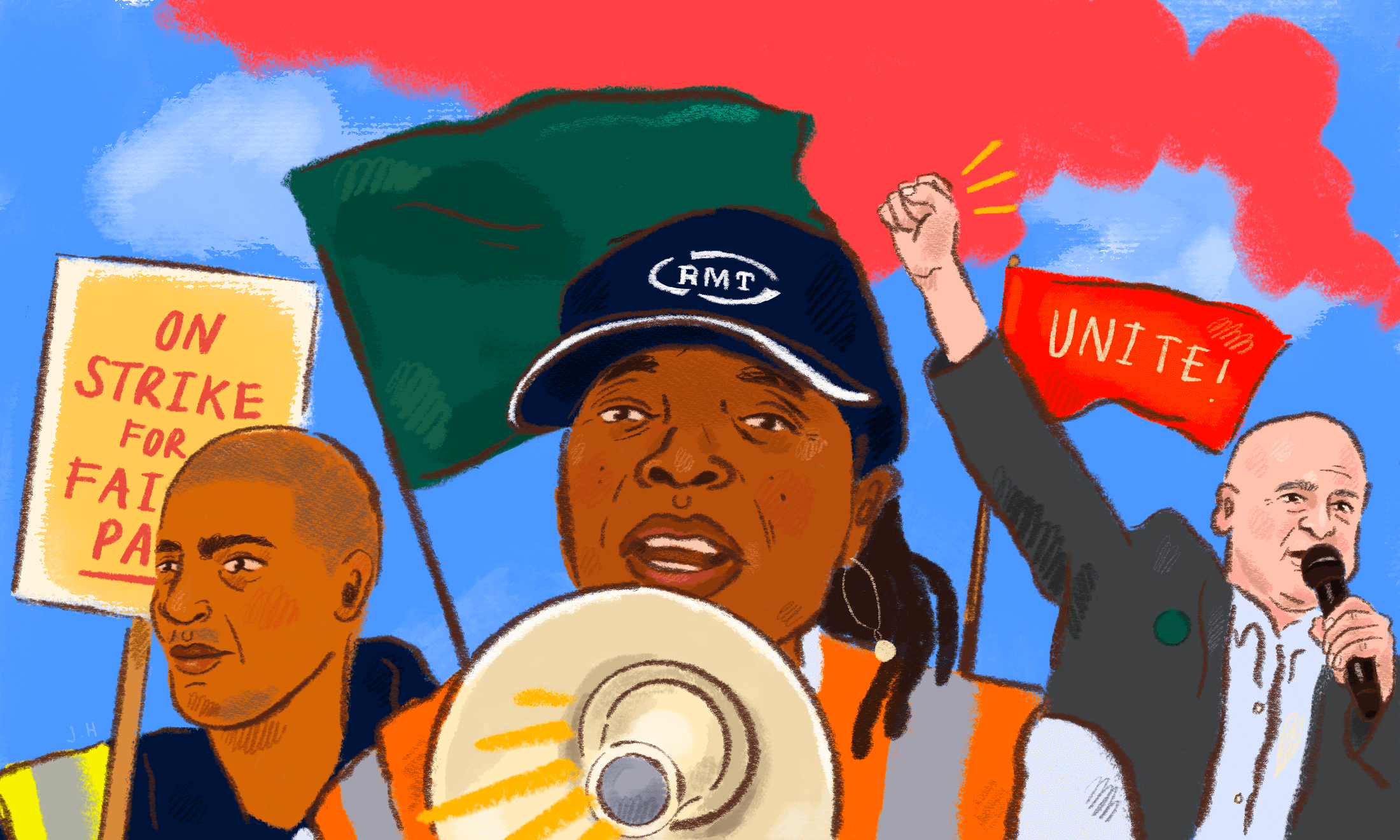
Javie Huxley
Hot strike summer: how collective action sparked a new wave of solidarity
Fuelled by unions and strikers across the UK, this movement shows no sign of stopping – and proves these struggles are all rooted in the same oppressive forces.
Prishita Maheshwari-Aplin
10 Oct 2022
The cost of living crisis is impacting all aspects of our lives, from renting and dating troubles to soaring energy bills and food prices. Over the next two weeks and beyond, gal-dem is publishing stories exploring our communities’ experiences during this tumultuous time – and what we can do to collectively work towards a fairer future.
Thousands of people gathered outside London’s King’s Cross Station on 1 October, holding signs that read “Tory Scum” and “End Capitalism”. They shouted “freeze profits, not people” while Postman Pat took to the stage in support of postal workers, as union members waved flags alongside climate activists.
There were scenes like this at rallies in 50 towns and cities; from Norwich, to Cardiff and Glasgow, protestors called for a real pay rise, an end to food poverty, stable housing for all, and increased taxes for the rich. Brought together by Enough is Enough – a joint campaign between trade unions, community organisations, and MPs Zarah Sultana and Ian Byrne – hundreds of thousands of people joined striking workers across the country to fight the cost of living crisis.
This National Day of Action coincided with a marked increase in gas and electricity unit prices. But it also signified the next stage after a long summer of strikes, where workers from sectors across transport, communications, criminal courts and refuse collection have been fighting for fair wages and safer working conditions. Labelled “hot strike summer”, the last few months have been heating up in more ways than one. Following a decade of austerity and cuts to public services amid an environmental crisis, people are now overcoming individualism and organising in solidarity.
Just as over a million people came together and fought for fairer wages in 1978-9, during a season dubbed the “Winter of Discontent”, the labour force is once again rising up. The UK is facing soaring inflation reminiscent of the late 70s, set to top 22% by the end of the year, but with RPI (real inflation rate) standing at 12.3%, the pay increases of approximately 2-5% being offered to public sector workers equate to a ‘real terms pay cut’. With the government’s new £150bn energy price guarantee, average annual household bills are expected to rise to £2,500, leaving individuals with an impossible choice: “keep warm or eat”.
“The current pay offers across most industries has been the biggest drive for strike action,” says Grace Brown, an organiser with the UK’s second biggest union. “Companies are making record profits, but many workers are facing in-work poverty whilst their bosses hand themselves bonuses.”
With every chant, the flame that was ignited by rail workers in June has grown bigger and stronger. Fuelled by the tireless efforts of organisers across the UK, it shows no sign of extinguishing. “I think the movement is growing and more workers are starting to see what can be achieved through strong collective actions, and [they’re] looking at how they can apply that to their own workplace,” Brown adds.
Dismantling structures
This summer, the UK’s train and underground network ground to a halt in the biggest railway industrial action in 30 years. For months, rail workers had been asking for a 7% pay rise to keep up with rising inflation. They had emerged from a pandemic, where companies exploited their tireless work as propaganda to showcase a continued service while simultaneously pushing through contract changes. When it was revealed that rail operators were planning to “repurpose” all ticket offices within 18 months, and to force new entrants to work on Sundays and for longer before qualifying for a pension, the RMT began discussions with Network Rail and 13 other train operating companies.
But these negotiations soon collapsed, so the RMT balloted to strike. On 21 June, they walked out in protest of inadequate pay, low job security, and insecure terms and conditions – soon to be joined by around 40,000 workers belonging to other unions, such as ASLEF and the Transport Salaried Staff’s Association (TSSA).
“There’s no job security, there’s no guarantee that I’m going to get the pension that I was promised when I started at the Underground, and there’s no future prospect for younger people,” says Mel Mullings, who has been a member of the RMT as a London Underground train driver for 21 years.
“We were the ones who kept London moving during the pandemic, but we were denied PPE at the beginning and have had to constantly ask for handouts,” Mullings adds.
“The movement is growing and more workers are starting to see what can be achieved through strong collective actions”
Grace Brown
Following the death in 2020 of London transport worker Belly Mujinga from Covid-19 after allegedly being spat and coughed on – and who had been sent to work without PPE – serious questions were raised about the safety of frontline workers.
Mullings brings up the role racism played in the investigation after Mujinga’s death. Now, the injustices being faced by the labour force are also disproportionately impacting marginalised communities.
“Staff cuts have increased lone-working, which puts women at risk,” says Mullings. “There’s a big push on women’s safety in society, but I think that the government, the police, and employers have let us down. London Underground and TfL are not really looking after women.”
She adds: “A change from a final salary scheme for our pensions will also disproportionately harm politically Black people. And people with disabilities, who might only be able to do part-time work, will be put in a situation where they’ll have to work for a lot longer for a lot less money, and with a pension that’s not guaranteed.”
At a time when the conservative government and the media are pitting marginalised individuals against one another – white working-class communities against refugees; ciswomen against trans people – there’s transformative power in a movement that is bringing the public together. The increasingly coordinated actions currently snowballing across the UK are indicative of a collective realisation that all our struggles are rooted in the same violent forces that have oppressed many throughout history – the heavy hands of colonialism, imperialism, and capitalism. Though the public has shown up in huge numbers to stand in solidarity with the workers at the recent protests, this must come with an understanding that many organised structures have these oppressive forces woven into their very framework.
“Often those who consider themselves ‘left’ aren’t able to consider that they may also uphold systems and structures that oppress their comrades,” Brown states.
Without dismantling the structures that uphold the system against which they’re rallying, it’s not possible to build a true solidarity movement that is representative and protective of these communities.
“Often those who consider themselves ‘left’ aren’t able to consider that they may also uphold systems and structures that oppress their comrades”
Grace Brown
Brown believes workers do not receive appropriate support from unions when facing issues in the workplace linked to their race and gender, citing that she still experiences racism both from members and from union officials. Mullings adds that trade unions are “boys’ clubs” that need to actively champion anti-racism as part of their advocacy.
“We’re fighting for a lot more than just the ‘working class’, than just working people in organised unions. We’re talking about people in our community who don’t work, who have had to stop work, who might have to put themselves in very precarious situations,” adds Mullings.
“Until you eradicate racism, until you eradicate capitalism in its modern form, until you eradicate all these things that oppress people, the work will never stop getting done. You’ll continuously be distracted,” she says.
Despite facing additional challenges, individuals belonging to marginalised communities have been organising and leading actions across the workers’ rights movement. Mullings holds positions as the secretary of the Black Solidarity Committee for the London Transport Regional Council, and for the Black and Ethnic Minority Advisory Committee for the RMT. She has spoken out against Eddie Dempsey, the assistant general secretary of the RMT, calling for him to be held accountable for controversial comments he’s made in the past referring to minoritised communities.
Another such organiser is Karen Headley, CWU representative and assistant branch secretary.
“In this current climate, with the cost of living crisis affecting us all, no one can afford to strike. But if we do not, we will lose a lot more in the long term. We are not agreeing to a levelling down agenda,” Headley says.
The summer of strikes
On a crisp Friday morning in September, Headley stood alongside workers from the NW1 delivery office gathered at the picket line behind London Euston Station. Staff protested Royal Mail’s plans that would make Sundays compulsory working for all workers, lead to pay cuts, and change rules around statutory sick pay. Royal Mail’s annual profits quadrupled between March 2020 and 2021, with pre-tax profit reaching £726m compared to £180m a year earlier. But Royal Mail workers have only been offered a 2% pay rise, even with inflation.
This was Royal Mail workers’ fourth strike day since 26 August, when around 115,000 CWU members walked out for the first time in 13 years. They’ve announced a further 19 strikes over the next two months. And they’ve not been alone in joining rail workers in taking strike action this year. Since late August, workers at Port of Felixstowe have chanted “shame on you” as they gathered opposite the port’s entrance. They striked this summer for the first time in over 30 years after eight months of disputes with the port and its parent company CK Hutchison, where they were asking for a 10% pay rise. Criminal barristers have also taken to the streets in their wigs, starting with a two-day walkout in late June. They’ve since gone on strike every week to demand a 25% legal aid pay increase and protest the government’s offer of only 15%.
More than 40,000 of BT’s staff have also organised five strikes since their first national strike in 35 years on 29 July, demanding a pay rise in line with inflation. And further education staff have walked out at Burnley College, The Manchester College, City of Liverpool College, and Oldham College on 6 and 7 September after initial strikes in May. This is in response to a 2.5% recommended pay rise by the Association of Colleges, while the UCU states that the pay of staff has already fallen 35% behind inflation since 2009.
Although they’ve faced criticism from officials and media outlets – and the government has recently pushed through regulations that would allow agency workers to fill in for striking workers in order to break strikes – these parallel actions within the public sector are not in vain. Pressing yet more firmly on the exposed jugular of capitalist greed, they’re beginning to garner success.
The RMT’s timely action delayed Network Rail’s move to scrap 600 jobs, and pay offers for bus drivers have gone up from an initial offer of 3% around the UK. In fact, Aviva workers in Liverpool cancelled further strikes after the company put forward an improved pay offer, while bus strikes in London were called off after a new 11% pay offer. After public outcry and criticism from financial markets and colleagues, Kwasi Kwarteng, the chancellor of the exchequer, announced a U-turn on initial plans outlined on 23 September as part of a “mini-budget”. These would have scrapped the top 45p income tax rate on earnings more than £150,000. And after public pressure – although it does not go nearly as far enough – Prime Minister Liz Truss laid out plans for a new energy plan that would cap energy bills at an average of £2,500 a year for the average household.
So what’s next? As we look toward this next phase, dubbed “Act 2: The Autumn of Action”, with hope – with teachers, nurses, airport staff and firefighters balloting to join those striking – coordination between unions and members of the public is likely to build on the foundations that have been laid. The people are angry, and actions so far this year have chipped away at layers of lethargy to reveal the strength behind grassroots advocacy and collective action. With organisations like Enough is Enough, Don’t Pay UK, and trade union organising body TUC creating links between active hubs across the UK, it’s only a matter of time before the entire network is one of solidarity, ablaze with the fires of passion, innovation, and transformation.
Read more about the Enough is Enough campaign here, and follow the strikes at strikemap.co.uk.
Our groundbreaking journalism relies on the crucial support of a community of gal-dem members. We would not be able to continue to hold truth to power in this industry without them, and you can support us from £5 per month – less than a weekly coffee.









